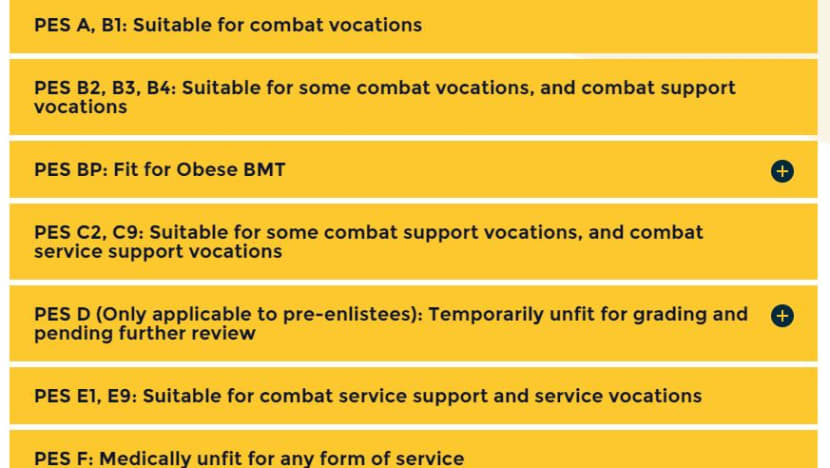Enough help for servicemen with mental health issues, experts say, but some still find NS a challenge

Over the past five years, about 4 per cent of each NS cohort were downgraded for mental health issues. (Photo illustration: Jeremy Long)
SINGAPORE: While the Singapore Armed Forces (SAF) has in place sufficient measures to detect and help pre-enlistees with mental health issues, experts said some might still slip through the cracks and face difficulties during National Service (NS).
Defence Minister Ng Eng Hen, in a written reply to Parliament in August, revealed that over the past five years, about 4 per cent of each NS cohort has been downgraded for mental health issues.
According to Ministry of Defence (MINDEF) figures, about 15,000 men enlist for NS each year.
“The majority were downgraded after the pre-enlistment check-ups before commencing their NS, and therefore the prevalence of mental disorders for national servicemen reflect that of the male population in Singapore,” Dr Ng wrote.
At the pre-enlistment stage, pre-enlistees undergo a “comprehensive” medical screening – including self-declaration and parent endorsement – for psychiatric, behavioural and adjustment problems. MINDEF also works with the Health Ministry to identify those with mental health history at public hospitals.
Pre-enlistees are exempted from NS if they are deemed to have “severe mental illnesses” that prevent them from performing their NS duties. From 2005 to 2015, about 400 pre-enlistees have been exempted from NS each year.
Dr Lim Boon Leng, a psychiatrist at Gleneagles Hospital who sees youths who face difficulties in coping with NS, said these measures are "sufficiently stringent".
"However, it is pertinent to note that there are no screening processes that are foolproof or 100 per cent accurate," he added. "These processes are also subjective and dependent on the cooperation of the pre-enlistees and their parents."
Dr Marcus Tan, a psychiatrist at Nobel Psychological Wellness Clinic who is trained in military psychiatry, said the measures are "as comprehensive as the ministry can muster at this point in time".
However, he acknowledged that there are servicemen, including those who do not declare their mental illnesses, who "slip through the gaps" and eventually "encounter difficulty post-enlistment".
STRUGGLING WITH NS
One example is 21-year-old Derrek (not his real name), who was diagnosed with major depressive disorder in primary school.
Derrek told Channel NewsAsia that during his pre-enlistment check-up, he declared his condition to the medical officer, and was eventually assigned a PES E9L9 grade. This means he was still fit to serve NS.

PES refers to the Physical Employment Standards, which according to the Central Manpower Base is assigned based on a serviceman’s medical condition and is one factor used to determine his NS vocation.
While PES A and B1 indicate suitability for combat vocations, PES E denotes suitability only for combat service support and service vocations. PES F means exemption from NS.
Derrek enlisted last October and completed one month of Basic Military Training with fellow PES E servicemen before getting posted to the Navy as an administrative assistant.
His condition, however, worsened.
In January, about two months into his new posting, Derrek said his mental health spiralled “out of control”.
The next month, Derrek was further downgraded to a pending exemption, before being granted full exemption from NS in April.
MENTAL HEALTH AND NATIONAL SERVICE
As with Derrek, NS is a “big change for any enlistee”, said the psychiatrist Dr Lim.
“People who are suffering from mental health issues are more sensitive to changes in life, may have more difficulties coping with these changes and may take a longer time to adjust,” he added.
“Those who are unable to transit into military life may find themselves having adjustment disorders with emotional and behavioural disturbances. Some may develop anxiety disorders and depression, particularly if they are already vulnerable in some ways.”

These servicemen might also experience mood, sleep or appetite disruptions due to the change in circumstances, Dr Tan said.
“They may experience exacerbation of their conditions and will need to be monitored intently, with requisite adjustments made to their immediate operating environments as needs arise,” he added.
WHAT IS THE SAF DOING?
In another written reply to Parliament last year, Dr Ng said enlisted servicemen with mental health issues are “closely monitored while in service, and where necessary, are provided with regular medical treatment and counselling by psychiatrists, psychologists, counsellors and para-counsellors”.
The SAF has more than 1,200 of such psychiatrists, counsellors, para-counsellors and psychologists. It also draws on resources in the national healthcare system, including the Institute of Mental Health and psychiatric departments in restructured hospitals.
READ: Servicemen with mental health issues provided counselling, medical treatment: MINDEF
Besides that, unit commanders interview servicemen at “regular intervals” to check if they are under any form of stress, including emotional or psychological problems. At the formation level, dedicated psychologists help commanders manage such servicemen.
Commanders also undergo “basic training” to help them better understand mental health conditions and manage servicemen with such conditions. This includes referring them to trained professionals or restricting their access to weapons and ammunition.
For the servicemen themselves, there’s a 24-hour SAF counselling hotline.
ARE THE MEASURES ENOUGH?
But Derrek said he still found it difficult communicating his issues to his commanders during NS.
“As much as they wanted to help, they simply were not equipped as they did not understand the basics of mental health and the implications of mental illnesses,” he added.
READ: People with mental health issues face workplace discrimination
Still, the psychiatrists Dr Tan and Dr Lim insisted that the SAF’s measures to manage servicemen with mental health issues during NS were adequate.
"The measures are adequate to address day-to-day (issues) as well as contingencies," Dr Tan said. "To have this system work well, close and timely communication between the serviceman, unit superiors and each member of this team will be key."
THE STIGMA OF MALINGERING AND EXEMPTION
However, Dr Tan urged commanders and servicemen to better understand common mental health conditions and how to manage them, while Dr Lim said the lack of mental health awareness is an issue that goes beyond the SAF.
“The problem is really a societal one and lies in a lack of understanding of mental illnesses, whereby leaders and commanders often assume those who declare their mental health issues to be malingering,” Dr Lim explained.
In 2014, an anonymous person posted online detailing how he allegedly escaped NS by faking mental illness, prompting a MINDEF investigation.
READ: A commentary on failing to understand that some people are more prone to mental illness
“Stigmatisation (surrounding malingering) often prevents those in need from seeking help,” Dr Lim added. “Improving the mental health literacy of commanders will no doubt help.”
There’s also the stigma associated with getting exempted from NS due to mental illness, something Derrek said he worried about even before enlisting.
“Admittedly, being exempted from NS on these grounds can cause self-stigmatisation and impact personal confidence,” Dr Tan said.
These men will also have to explain their exemption to future schools and employers, and therefore reveal their mental illnesses, Dr Lim added.
As for Derrek, he said he is doing much better now that he's out of NS, adding that his exemption has not affected his prospects in any way.
MANY STILL COMPLETE NATIONAL SERVICE
Defence Minister Dr Ng told Parliament in 2014 that “under our present regime, there have been many national servicemen with mental health disorders who have completed their NS duties well”.
Dr Tan, the psychiatrist, agreed, noting that most of the servicemen in this category “come out stronger through the NS experience”.
Nevertheless, Dr Ng said MINDEF and the SAF will continue to “periodically review and strengthen” its mental health system in consultation with its Psychiatry Specialist Advisory Board, which comprises senior psychiatrists from private practice and public hospitals.
“(This is) to ensure that all our national servicemen with medical conditions receive good care during NS,” he added.














